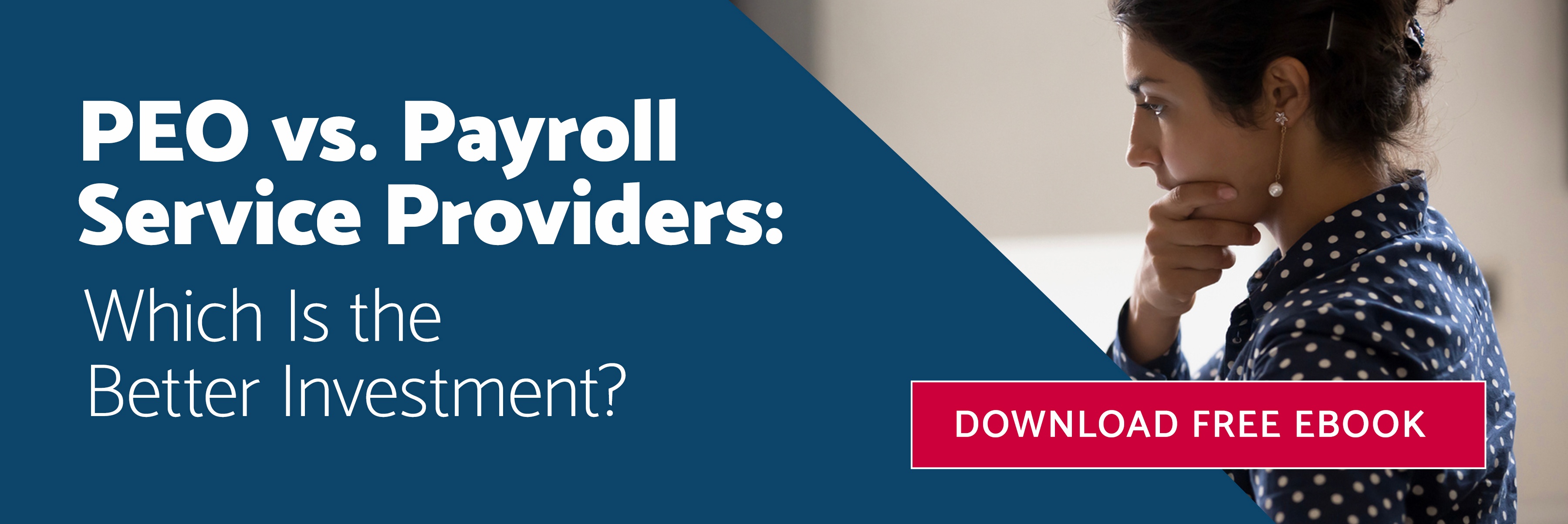OneSource Business Solutions Blog
Pay-As-You-Go Workers' Comp: The Dirty Truth
.jpg?width=676&name=pay-as-you-go-workers-comp%20(1).jpg)
The internet is full of misrepresentations about pay-as-you-go workers' comp.
Many of the websites and articles you stumble across when looking for help are written by insurance carriers. They always suggest the only form of pay-as-you-go workers' comp requires a deposit.
That's simply not true.
Professional Employer Organizations (PEO) offer pay-as-you-go workers' comp with zero deposit. This is a major reason why companies partner with a PEO. Not only does this provide their injured employees the coverage they need, but your premiums are also based on actual payroll, with no deposit required.
What is Pay-As-You-Go Workers' Comp?
Pay-as-you-go workers' comp is a payment plan for your workers' compensation insurance coverage that bases your monthly premium on your actual payroll. This benefits your business because you do not have to estimate your premiums and end up owing more or getting a refund at the end of the year.
Pay-as-you-go workers' compensation allows your company to spread out your payments. Instead of paying the annual premium up front at the beginning of the plan, you pay a monthly premium based on your actual payroll. This helps to ensure your business pays exactly what it needs to over the course of the plan — nothing more, nothing less.
Pay-As-You-Go Versus Traditional Workers' Comp
Traditional workers' compensation insurance requires your company to pay a premium based on your expected payroll for that year. After the plan year is complete, the insurance company audits your payroll to determine if the estimated payroll was accurate. It's never precisely accurate, so an adjustment must be made. Either the insurance company sends you a check to give you money back that you overpaid, or you have to pay the insurance company for any underpayment.
Pay-as-you-go workers' comp insurance takes the guesswork out of it. Instead of paying a lump sum at the beginning of the policy, which could wreak havoc on your budget, the insurance company takes payment every time you process payroll.
This is a much more efficient way to pay your workers' compensation premiums. It helps you properly budget for the payments, and you can avoid saving up for any extra financial burden at the end of the plan year.
Two Types of Pay-As-You-Go Workers' Comp
Many of the articles you may find online describe pay-as-you-go workers' comp as offering your business a smaller deposit plan, not a zero deposit plan. That is the difference between partnering with a PEO for your workers' comp coverage or using an insurance company or broker.
With a PEO, you get access to the PEO's workers' comp plan, which means truly zero deposit for you. This also means you get access to the PEO's experience modifier rates and premiums, which may be lower than what you can get on your own. Because the PEO has already paid the deposit on their plan, you do not have to lay down a cent.
Insurance companies and brokers cannot and do not offer businesses a zero deposit plan.
Only PEOs do.
Partnering with a PEO means your business can avoid paying a workers' comp deposit and also ensures you pay only exactly the premium you need to during each payroll. Because your PEO will handle your payroll, they will have an exact payroll amount and be able to debit your account the exact workers' comp premium amount, leaving no guesswork and no bills due at the end of the year. They are also able to perform any needed workers’ comp audits.
How to get True Pay-As-You-Go Workers' Compensation Insurance
Partnering with a PEO is the only true way to get zero deposit pay-as-you-go workers' compensation insurance coverage for your business. Every other way will require a deposit from your company.
The insurance company is in the business of making money. They may offer a pay-as-you-go option but they will still charge your company an up front deposit. Your business may still end up with a bill due to them at the end of the year because the premium calculation was slightly off. This means you still have to create some cushion in your budget and be prepared for extra expenses.
To avoid this situation and to accurately budget for your workers' compensation coverage, work with a PEO. Your PEO will not charge you any up front costs for your company's workers' compensation insurance coverage. They will not send you a bill at the end of the year for any unpaid premiums. Your PEO will collect the exact amount due during every payroll run, ensuring complete accuracy.
With a PEO, you join the PEO's existing workers' compensation insurance plan. So the PEO has already paid the deposit. Going this route, you can avoid paying any upfront costs or a deposit for workers' compensation insurance coverage.
Workers' compensation coverage is not the only reason to choose a PEO for your business. The advantages are plenty. Partnering with the right PEO can help your business reap a positive ROI by offering you a true zero deposit pay-as-you-go workers' compensation plan.
Recent Posts
Posts by Topic
- HR Outsourcing (37)
- Employee Benefits (14)
- Payroll & HR Administration (5)
- Strategic Planning & Research (5)
- Company Culture (4)
- HR Compliance (4)
- Industry – Professional Services (4)
- PEO (4)
- Workers’ Comp (4)
- Employee Turnover (3)
- OneSource PEO Company News (3)
- performance management (2)
- Navigating COVID-19 (1)
- manufacturing industry (1)
